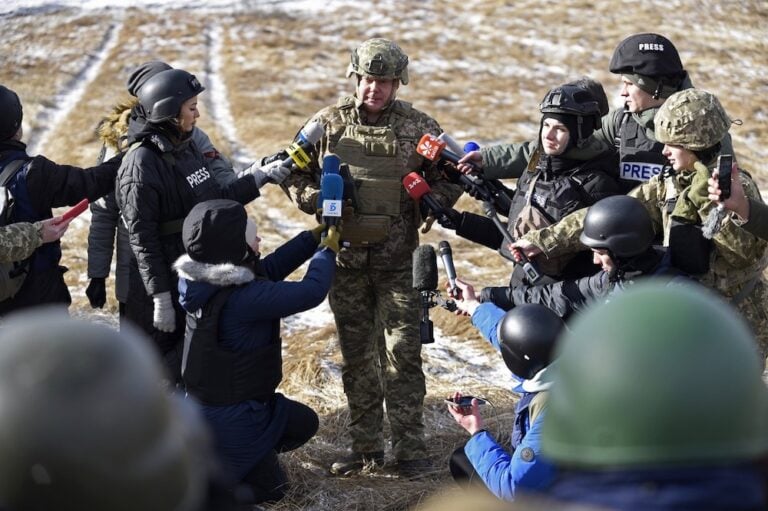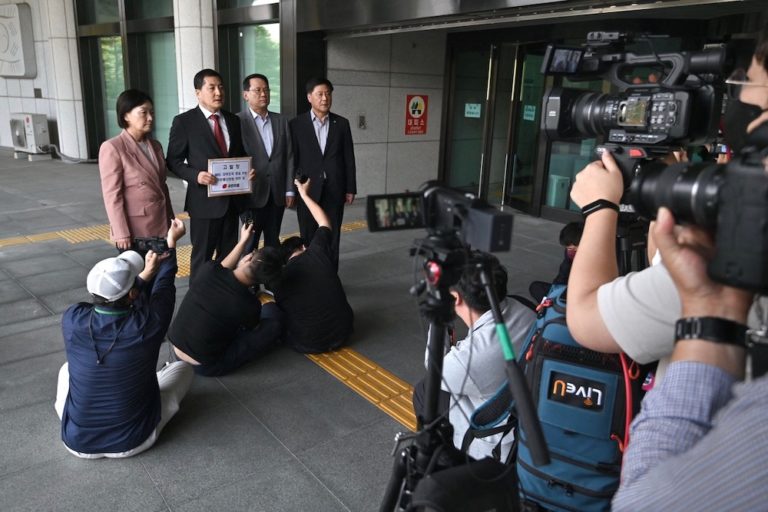In a letter to the president of South Korea, CPJ calls attention to his administration’s increasing pressure on the country’s media and the arrests of four staff members of the country’s second largest broadcaster, deeming it an attempt to stifle independent reporting critical of government policies. (CPJ/IFEX) May 7, 2009 President Lee Myung-bak Cheong Wa […]
In a letter to the president of South Korea, CPJ calls attention to his administration’s increasing pressure on the country’s media and the arrests of four staff members of the country’s second largest broadcaster, deeming it an attempt to stifle independent reporting critical of government policies.
(CPJ/IFEX)
May 7, 2009
President Lee Myung-bak
Cheong Wa Dae
Seoul
Republic of Korea
Via Ambassador Han Duk-soo
Ambassador of the Republic of Korea
2450 Massachusetts Ave. NW
Washington, D.C. 20008
Via facsimile 202-342-1597
Dear President Lee:
The Committee to Protect Journalists is concerned by your administration’s increasing pressure on the Republic of Korea’s media. The arrest on April 28 of four staff members with your country’s second-largest broadcaster, Munhwa Broadcasting Corporation (MBC), is only the most recent step in what appears to be a broader effort to stifle independent reporting critical of government policies.
On May 1, prosecutors told reporters at a Seoul press conference that the four MBC staffers – reporters Cho Neung-hee and Song Il-jun and newsroom writers Kim Eun-hee and Lee Yeon-hee – were arrested the day before in connection with a report by the station last year. They were charged with spreading false rumors that said U.S. beef caused mad cow disease in humans. They were arrested soon after they left the MBC building, where they had protested their prosecution for a month.
On April 13, MBC fired Shin Kyung-min, anchor of its primetime news program “News Desk.” South Korean media gave extensive coverage to ensuing protests of the May 1 arrests by staff of your country’s four major broadcasting stations. Shin had been the anchor when the mad cow story aired on the channel’s investigative show “PD Notebook,” and had a reputation for being openly critical of your government.
MBC President Ohm Ki-young denied charges that Shin was fired because of his role in reporting the story or his anti-government positions. Ohm was widely quoted as saying that the firings were carried out to “regain” political balance and credibility and to better compete with the rival 9 p.m. news at the state-run Korean Broadcasting System.
We are concerned because the prosecutions, sackings, and protests come amid a broader set of disputes with the government and the station’s management. In 2008 your government said it would accelerate its plan for deregulation of the republic’s vibrant media industry. The TV networks resisted the plan, because they were worried about more restrictive media rules after corporate takeovers and cross-ownership by newspaper publishers. Some media analysts say the government is behind the move because only three right-leaning pro-government Korean-language papers are wealthy enough to buy up the stations. Unionized workers at three stations, the state-owned Korean Broadcasting System (KBS), Seoul Broadcasting System, and MBC, went on strike in protest.
The situation escalated in March this year, when four journalists at the 24-hour news channel YTN were arrested for “interfering with business.” Even though they were quickly released on bail, they are still being prosecuted. They protested the appointment of your former aide Ku Bon-hong to head YTN. About 58 percent of YTN stock is owned by four state-run companies – shares the government wants to sell off to the private sector.
It is not just broadcasters who have been subjected to government restrictions. In early April, the government passed legislation requiring South Korean Internet users to submit their real name and residence registration number before using any major Web site that has more than 100,000 distinct users each day – a law first proposed by the preceding government of President Roh Moo-hyun. The law allows people to use anonymous names when surfing the Web or posting comments, but must supply their full identity to Internet service providers who then have to turn it over when requested by the government. Journalists and bloggers can no longer write without revealing their identities to authorities.
To read the full letter, see: http://cpj.org/2009/05/cpj-concerned-by-south-korean-pressure-on-media.php


